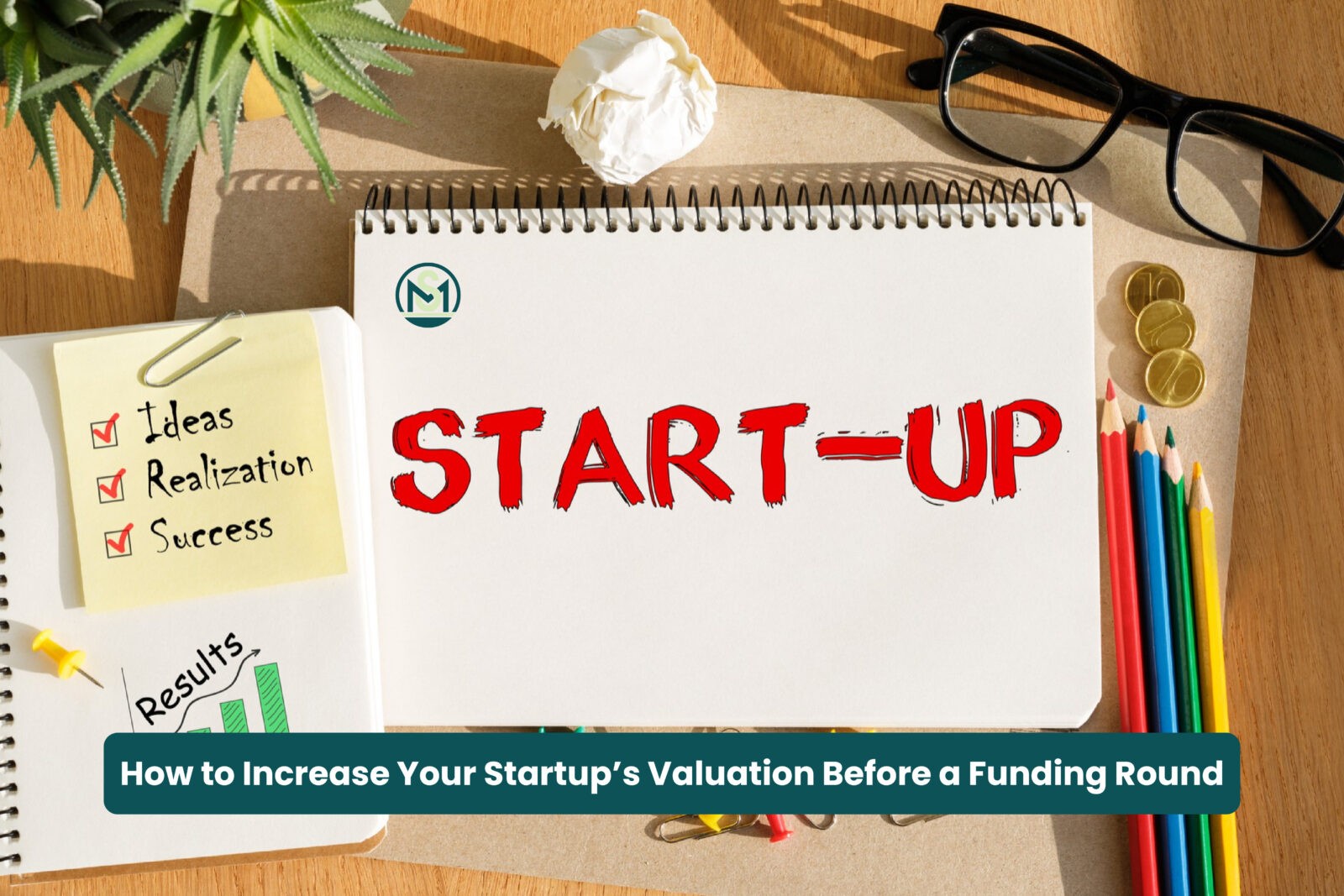When Valuation Isn’t Just a Number, It’s Your Leverage
You’ve put in the sleepless nights, the relentless hustle, and built something out of nothing. Now you’re about to raise funds. But here’s the catch: how much your startup is worth before you pitch will decide everything.
Your startup’s valuation isn’t just about revenue or users. It’s about how confident investors feel when they look at your business. It’s about the story you tell through your numbers, traction, team, and future potential.
If you go into a funding round without preparing, you risk selling your company short. But if you plan smartly, you can increase your startup valuation, sometimes even without a cent of added revenue.
Let’s explore how to increase your startup’s valuation before a funding round with practical, real-world strategies that work.
1. Build a Strong Founding Team That Investors Can Trust
Investors rarely bet on ideas alone. They bet on the people behind them. A seasoned and balanced team can boost your startup’s valuation even before you make a dollar.
Have co-founders who complement your skills
Hire advisors with deep industry experience.
Show a clear division of responsibilities.
Why this matters: Investors value startups with leadership that’s experienced, committed, and capable of executing. In fact, according to a CB Insights report, 23 percent of startup failures are due to the wrong team.
Highlight your team’s background and relevant past wins in
Your pitch deck and online profiles.
2. Show Real Traction, Not Just Promises
Early-stage startups are often pre-profit, but that doesn’t mean they’re pre-value. Traction is your proof of concept.
Here’s what counts as traction:
- Active users or paying customers
- Rapid month-over-month growth
- Strategic partnerships
- Retention and engagement rates
Even if you’re in pre-revenue, a strong growth curve can raise company valuation before investment. It’s the difference between telling investors “We might grow” and “We’re already growing.”
3. Clean Up Your Financials Before You Walk into a Room
Imagine asking for investment while your books are a mess. It kills confidence instantly.
To boost your startup valuation, make sure:
- Your financial statements are updated.
- You’ve separated personal and business expenses.
- Your burn rate and runway are crystal clear.
Why it matters: Transparency builds trust. And trust builds value. Investors won’t spend time digging through confusing spreadsheets.
Have a third-party accountant review your books before a funding round.
It shows seriousness.
4. Refine Your Product Until It’s Too Good to Ignore
Your startup’s valuation increases when your product is well-tested and solves a real problem.
Don’t just focus on features, focus on:
- User feedback
- Iterations based on real-world use
- Ease of onboarding
- Product stickiness
Investors don’t want to fund half-baked ideas. They want to back products that are already working for real users.
5. Own Your Market Research and Competitive Advantage
Investors value startups that understand the playing field. So many founders skip this. Don’t be that founder.
You need to show:
- Why your market is growing
- How do you stand out from competitors
- What prevents others from copying you
This shows you have a startup valuation strategy, not just a dream.
Highlight trends, numbers, and credible data sources in your pitch, not just opinions.
6. Strengthen Your Intellectual Property
If your startup has unique tech, content, or tools, protect it. Having intellectual property (IP) can offer a pre-funding valuation boost that investors take seriously.
Types of IP include:
- Patents
- Trademarks
- Proprietary algorithms
- Exclusive data access
This gives you a competitive moat, and that raises your startup’s valuation because it shows defensibility.
7. Reduce Risk Factors That Scare Investors
Every investor calculates risk when determining how much your startup is worth.
Here are the red flags that indicate a lower valuation:
- No clear revenue model
- Legal disputes
- Single point of failure (like only one supplier or tech person)
- Heavy dependency on one client
Addressing these proactively helps increase your startup’s valuation.
Have a risk mitigation slide in your pitch deck. Show
How you’re already thinking ahead.
8. Use Social Proof and Media to Build Trust
Your startup’s valuation isn’t just based on what’s happening inside your business. It’s also influenced by perception.
Build your reputation with:
- Media features
- Speaking at industry events
- User testimonials
- Case studies
- Awards or recognitions
Why does this work? Investors value startups with credibility and momentum. It tells them others already believe in you, and so should they.
9. Show a Scalable Growth Plan
Investors don’t want just a good product. They want a growth engine.
Here’s what helps:
- Clear user acquisition channels
- A tested marketing strategy
- Retention data
- Lifetime value vs acquisition cost (LTV vs CAC)
A scalable business model shows potential, and that directly raises your company’s valuation before investment.
10. Build a Waiting List or Community
Before you even raise funds, prove people want what you’re offering. One way to do that is by building a pre-launch waiting list or loyal user community.
Examples:
- 10,000 users signed up before you even launched
- An active Discord or WhatsApp community giving feedback
- Beta testers are helping shape your product.
This shows demand. And demand increases your startup’s valuation.
11. Nail Your Story and Pitch
This part is often underestimated. Investors don’t just invest in numbers; they invest in stories.
Your story should answer:
- Why now?
- Why is this a problem?
- Why are you the team to solve it?
Founders who can clearly explain the value of their startup will always have an edge.
Keep it short, visual, and focused. Don’t overwhelm
with technical jargon. Clarity = confidence.
12. Get Strategic Advisors on Board
Strategic advisors can fill knowledge gaps and lend credibility. Having respected names on your cap table or advisory board is a great startup valuation strategy.
Pick advisors who can:
- Open doors to big clients
- Offer technical guidance
- Bring fundraising experience
They don’t need to work full-time. Even a few hours a month can help, both in decisions and in increasing your startup’s valuation.
13. Show Future Revenue Streams
Investors are always asking: How will this business grow beyond what it is today?
To answer this, you can:
- Show product roadmap expansions.
- Explore upsell and cross-sell opportunities.
- Introduce secondary revenue channels.
This shows long-term thinking, and it tells them your startup valuation isn’t just about today, it’s about what’s coming next.
14. Create Urgency Through Investor Demand
Nothing increases valuation like competition. If multiple investors are interested, your leverage grows.
Ways to build urgency:
- Create a structured funding round with deadlines.
- Share updates showing momentum
- Stay visible in investor communities.
Don’t fake urgency. But do keep the energy and updates flowing to maintain interest.
15. Use a Realistic Valuation, Not a Dream Number
Ironically, one of the best ways to raise your startup valuation is to be grounded in reality. Overvaluing too early can push investors away or harm future rounds.
So, how do you stay realistic?
Benchmark against similar startups in your industry and region
Consider your stage and metrics.
Be open to flexible terms with savvy investors.
Investors value startups that are coachable, smart, and long-term focused.
Let’s Sum It Up: Your Startup’s Valuation Is a Reflection of Preparedness
If you walk into a funding round with a polished pitch, a sharp team, clean numbers, apparent demand, and solid traction, investors will take notice. They’ll compete to invest. And when they compete, your startup’s valuation goes up.
Don’t wait for luck. Build the value before you raise.
How MSAFDAR Can Help You Raise Your Startup’s Valuation?
At MSAFDAR, we’ve helped dozens of founders increase their startup valuation with solid financial models, audit-ready reporting, and tailored fundraising strategies. Whether you need to prepare investor decks, define your revenue forecast, or make sense of your numbers, we’re here to make sure your startup enters every funding round with confidence and control.
Visit msafdar.com to see how we’ve helped startups just like yours.
FAQs
Q1: Can I raise my startup’s valuation without making more revenue?
Yes, absolutely. A strong team, clean financials, user growth, and market potential can all raise a company’s valuation before investment.
Q2: What is the best time to start thinking about valuation?
You should plan for your startup’s valuation at least three to six months before a funding round. That’s enough time to fix gaps and build leverage.
Q3: Will hiring advisors or mentors help in valuation?
Yes. Strategic advisors add credibility, reduce risk, and often attract better investors.
Q4: What mistakes reduce startup valuation?
Lack of traction, unclear financials, weak team, over-promising in pitch, or unrealistic valuation asks all hurt your potential.
Q5: Do investors only look at numbers?
Not at all. Investors value startups based on a mix of metrics, team, product potential, and storytelling. It’s the complete picture that counts.




